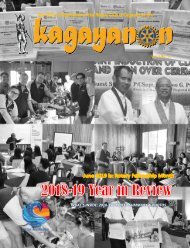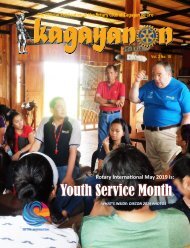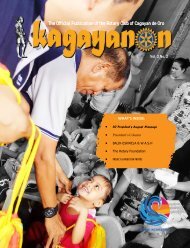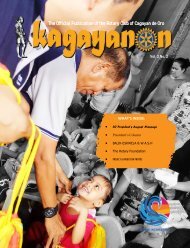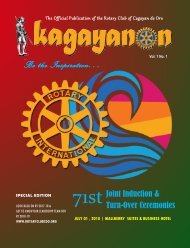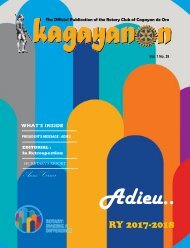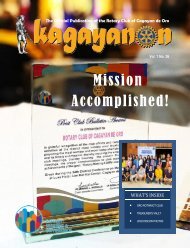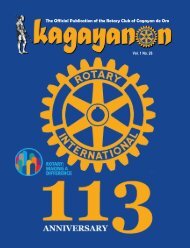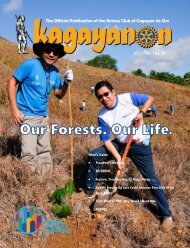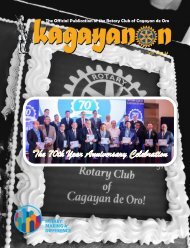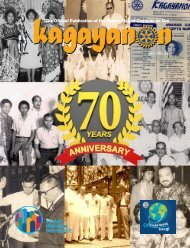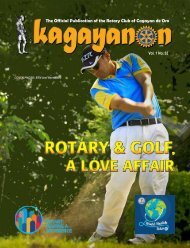RCCDO January25 Bulletin
The Official Publication of the Rotary Club of Cagayan de Oro
The Official Publication of the Rotary Club of Cagayan de Oro
Create successful ePaper yourself
Turn your PDF publications into a flip-book with our unique Google optimized e-Paper software.
HONORARY MEMBERSHIP<br />
“H<br />
onorary” is one of the two types<br />
of membership a person may<br />
have in a Rotary Club. This type of membership<br />
is the highest distinction a Rotary<br />
Club can confer and is exercised only<br />
in exceptional cases to recognize an individual<br />
for unusual service and contributions<br />
to Rotary and society. Honorary<br />
members cannot propose new members<br />
to the club, do not hold office and are<br />
exempt from attendance requirements<br />
and club dues. Many distinguished heads<br />
of state, explorers, authors, musicians,<br />
astronauts and other public personalities<br />
have been honorary members of Rotary<br />
Clubs, including King Gustaf of Sweden,<br />
King George VI of England, King Badouin<br />
of Belgium, King Hassan III of Morocco,<br />
Sir Winston Churchill, humanitarian Albert<br />
Schweitzer, Charles Lindbergh, composer<br />
Jean Sibelius, explorer Sir Edmund<br />
Hillary, Thor Heyerdahl, Thomas Edison,<br />
Walt Disney, Bob Hope, Dr. Albert Sabin,<br />
British Prime Minister Margaret Thatcher<br />
and many of the presidents of the United<br />
States. Truly, those selected for honorary<br />
membership are those who have<br />
done much to further the ideals of Rotary.<br />
PAST SERVICE MEMBERSHIP<br />
A past service member is a retired person<br />
who is not yet qualified for senior<br />
active membership. One way a person<br />
can become a past service member is<br />
by being an active member and retiring<br />
from his or her business or profession.<br />
The Rotary club may also elect to past<br />
service membership a retired executive<br />
or professional who would have qualified<br />
for active membership when employed.<br />
In the latter case, there is no<br />
former classification associated with<br />
the individual. Despite a common misperception,<br />
a senior active member can<br />
never become a past service member.<br />
RULE OF 85<br />
The so-called “Rule of 85” is alive and<br />
well, although modified by the 2010<br />
Council on Legislation. It is hard to find<br />
because it is not officially called the<br />
“Rule of 85”, nor a type of Rotary<br />
membership (“Active” or “Honorary”<br />
are the only two) – it is merely a provision<br />
listed under “excused absences” in<br />
the Standard Rotary Club Constitution.<br />
It provides that if a members combined<br />
age and years of service equal 85 years<br />
or greater, they are at least age 65,<br />
and they ask to be excused, then they<br />
are excused. Additionally, they don’t<br />
count against the club’s attendance<br />
figures.<br />
Example: Member John Doe will be 65<br />
in June 2015 and he will have 20 years<br />
of service in October 2015. This qualifies<br />
him for exclusion from attendance<br />
starting in October 2015. This will not<br />
affect his or her membership status in<br />
any way, but will simply allow the Club<br />
Attendance Secretary to exclude him<br />
from the attendance percent if he does<br />
not make a meeting. However, if he<br />
attends a meeting he should be counted<br />
toward your overall percentage.<br />
17





